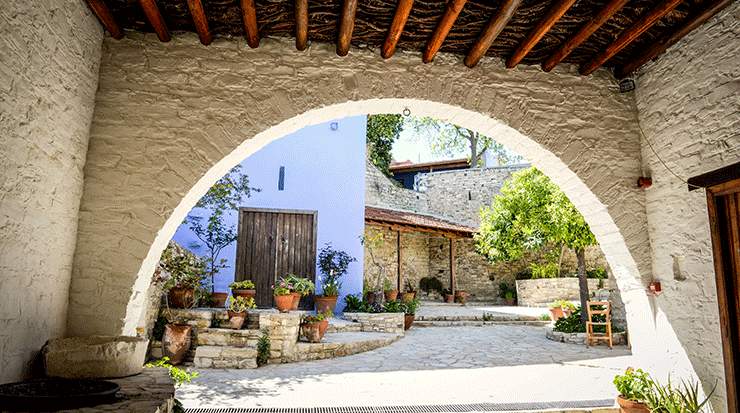There is no doubt that the mountainous resort of Larnaca region stands out for its unparallel, picturesque beauty, but the inclusion of the village on the list of ‘Best Tourism Villages’ was not given simply for its aesthetic quality, but also for its exemplary sustainable tourism practises.
This newest distinction follows the village’s inclusion in the list of ‘Europe’s 30 Most Beautiful Villages’ by Japan’s Association of Travel Agents (JATA), awarded for Lefkara’s appeal as a ‘complete’ destination with a clear identity and successful preservation of its rich, cultural heritage.
- A defining characteristic of Lefkara is its traditional folklore architecture. All the buildings in the heart of the amphitheatrical village feature local elements ‘inherited’ from bygone eras, including the use of locally-quarried stone, arches, terraces, balconies, large wooden doors and the distinctive indigo colour incorporated in some of the most charming houses nestled within the meandering cobbled lanes.
It is important to note that the strictly-implemented current legislation for the issuance of urban planning and building permits by the competent authority has greatly help to preserve and protect this unique heritage.
- The village as a whole constitutes an ‘open-air museum’ with 555 listed buildings and 35 ancient monuments, which makes it possibly the region with the highest number of protected buildings in proportion to its total number of buildings.
- The handicrafts of Lefkara – Lefkaritika (hand embroidered lace linens) and silversmithing, have been flourishing in the village since the 15th and 18th centuries respectively, and continue to this day. The tradition of Lefkaritika is the island’s only craft to be included in the ‘UNESCO World Heritage List of Intangible Culture’, and also the first and only craft to be certified by the ‘Cyprus Organisation for Standardisation’.
- The Lefkara Handicraft Centre operates daily and is open to the public. It was founded with the objective to encourage the new generation to learn the skills of Lefkara’s traditional handicrafts.
- Remarkable historical and religious sites can be found in every corner of the village. A magnificent mansion houses the ‘Local Museum of Traditional Embroidery and Silversmith-work, Lefkara’, incorporating the ‘Smithy’ (blacksmith’s workshop) that is open on the weekends. Lefkara has a total of 18 picturesque churches and chapels, including the 14th century church of Timios Stavros (Holy Cross) - an important monument where according to tradition, a piece of the Holy Cross is kept in a wood-carved iconostasis.
- The new, state-of-the-art Conference Centre with a 450-seating capacity and the latest technology is the village’s latest events venue, built in harmony with the village’s natural environment and characteristics.
- The abundant natural beauty of the village unfolds across an undulating backdrop that includes Lefkara dam (with fishing permitted with a licence), and the stunning panoramic views from the linear nature trail ‘Lefkara Trail – Kato Drys’, which connects Lefkara with neighbouring village Kato Drys through its 2.5 km.
- Clusters of ancient, 18th century olive trees surrounding the Byzantine church of Panagia Livadiotissa date back to the Frankish period, whilst other trees dotted across the village include some that are over 800 years old. These ‘living natural monuments’ have been declared as protected.
- In order for a tourist destination to be considered sustainable, the existence of locally-grown crops is a necessary condition. Lefkara’s organic olive oil production and winery make use of the village’s abundant olive groves and vineyards, whilst the area is also known for growing carobs and almonds, and for its honey production.
- The village is also home to two of the island’s most traditional offerings; tavas (slow-cooked meat) and the delectable ‘loukoumi’ sweet (Cyprus Delight), contributing to the enrichment of the island’s traditional gastronomy.
- Lefkara also offers an array of charming agrotouristic accommodation both in traditional houses and soon at the ‘Agora’ hotel, which is currently completing renovations.
- A year-round calendar of sports and cultural events take place in Lefkara and can be found on the LTB website monthly calendar of events in the region, and on Lefkara Municipality’s website.
The proposal made to the World Tourism Organisation was submitted by the Deputy Ministry of Tourism through LTB and was prepared by the Larnaca and Famagusta District Development Agency Larnaca District Development Agency (ANETEL), with assistance from Lefkara Municipality.























